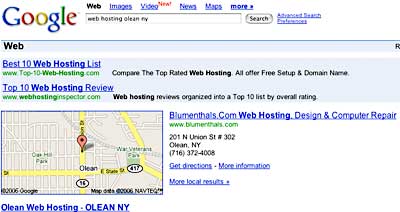Understanding Google My Business & Local Search
The road to Google Maps Nirvhana is paved with good intentions
In mid- July Search Engine Roundtable noted in a posting that Google Maps results with the map included were displaying prominently in the Google Organic results. Clearly for anyone attempting to optimize for local placement this possibility brought up images of the promised land.
 I experimented with tweaking our own listing and in our first listed category out of the 5 categories I had entered we succeeded in having our local listing include a map (and exclude other local listings from the front page). I followed my local guidelines and was able to achieve this ideal placement. That being said I do not fully understand exactly why the listing was upgraded from the normal 3 local text links that appear on the main search result.
I experimented with tweaking our own listing and in our first listed category out of the 5 categories I had entered we succeeded in having our local listing include a map (and exclude other local listings from the front page). I followed my local guidelines and was able to achieve this ideal placement. That being said I do not fully understand exactly why the listing was upgraded from the normal 3 local text links that appear on the main search result.
But as they say: pride cometh before a fall…
I came into work the other day and was reviewing a local client’s vacation rental listing and to my surprise and pleasure it had achieved a similar ranking. I was quite happy with myself and immediately called the client to see the listing in all of its glory. The clients name, address, map and webpage dominantly displayed just in time for her peak season.
But wait a minute! After showing it off to the client I noticed a slight aberration. It had the wrong URL associated with it. Not just any URL either but that of her arch competitor. My first thoughts ran to Google incompetence and then on to skull duggery by her nemesis.
Like many of our species I was all too ready to look for blame that wasn’t mine. I decided to go back and review the original listing that I had made many months before at the Google Local Business Center and after a few moments I realized that I had neglected to enter the clients URL in the correct field at the time of initial entry. And in this void Google had made their best guess..hmmph!
So like many cautionary tales the fault here lies in the simplest of human errors. And as is also the case mine not someone else’s.
© Copyright 2026 - MIKE BLUMENTHAL, ALL RIGHT RESERVED.



Comments
10 Comments
[…] In early October I wrote a post about achieving a “onebox” for a client on a valued search phrase (Vacation Rentals Ellicottville NY) BUT having the url Google had associated with the listing pointing to their competitor. After postulating conspiracies and incompetancies on the part of all but myself I determined that I had neglected to enter the client’s URL in the Local Business Center and Google, in its best guess, had made a not so harmless assumption. […]
[…] Onebox Authoritative Listing Map […]
Mike, I just noticed something strange: If you search for [pittsburgh gazebos] you’ll find a business that has a onebox authoritative listing, but they don’t even have a website. This listing displays when searching for many smaller locations in and around pittsburgh, eventhough other companies are geographically closer to the search criteria.
Have you seen anything like this before?
Reuben, essentially, Google thinks they (the onebox listing folks) are the ONLY “Gazebos” provider in Pittsburgh for a number of reasons: They have the word “Gazebos” in their name; It is likely that there is no category for this AND the site Google picked as the authoritative site (allpages.com) has a high page rank. So the whole outcome is determined by the algo on the organic side which as you can see “ain’t so smart” sometimes.
In local, when there is no website (many businesses don’t have them), Google will pick it’s best guess as the authoritative site. In my example they picked a competitor. It was the comptetitor’s site that led to the Onebox. When it was changed the favored listing was lost. In this case they picked “allpages.com” which clearly has a high pr score. (or whatever they are using here).
If you search on “pittsburgh gazebo” you see a more typical outcome.
If a client wants to be listed in the non-category they would probably need to add the word “Gazebos” to their title in the Google Local Business Center and/or as EarlPearl has suggested elsewhere optimize your site with “location + search phrase”
Thanks for the comments. My client’s site is already localized and has a GLBC account (I’ve been doing this for a while on a number of sites).
The other thing I noticed is that the category for that site is Gazebo Builder which is taken from Acxiom’s database, but that category is not present within GLBC. FYI Acxiom is the database behind yellowpages etc.
It just struck me as a bit odd the way they treated this business compared to others (not just my client) in this area.
Reuben
Is your local listing title optimized for the word “Gazebos”? (see https://blumenthals.com/blog/?p=12)
Mike
[…] I have seen and written about this happening before (see Redemption in the Gilded Google Age and The road to Google Maps Nirvhana is paved with good intentions). I too, at first, assumed evil intent. Usually though, it is caused by Google’s attempt to establish an authoritative website when none has been specifically entered. Bill Slawski has written about Google’s patent on this area in his Authority Documents for Google Local Search. Google’s guesses are mostly pretty good but as you can see from my experience, when it goes wrong, it goes really wrong. In their defense they fixed it reasonably quickly. […]
[…] The method leads to a mostly accurate Google Maps database in regard to which website is associated with which business. However, when Google makes an error in this assignment of the website, it can be a doozy. I have written about my experience here: The road to Google Maps Nirvhana is paved with good intentions and recently there was this post Competitor Hijacks Google Local Business Listing?. It is easy to see why people in the industry think that there is skullduggery afoot. […]
[…] have written about this problem in the “archeological” past (here and here) and noted that this assignment of URL’s was an artifact of an over aggressive Google […]
[…] words as truth this points to Google Algorithm. Mike Bluementhal has outlined several times how Google has been attributing the wrong URL to business. These examples point out that Google […]
Comments for this post are closed.